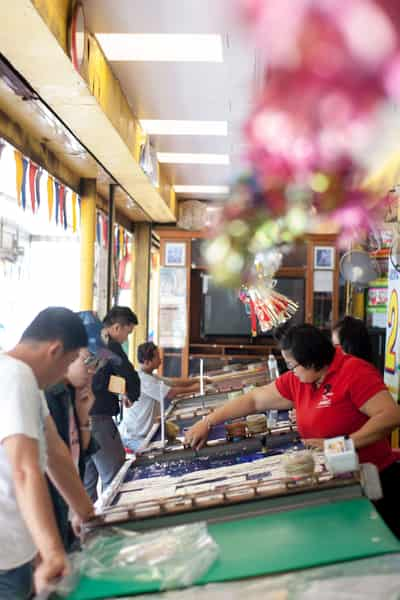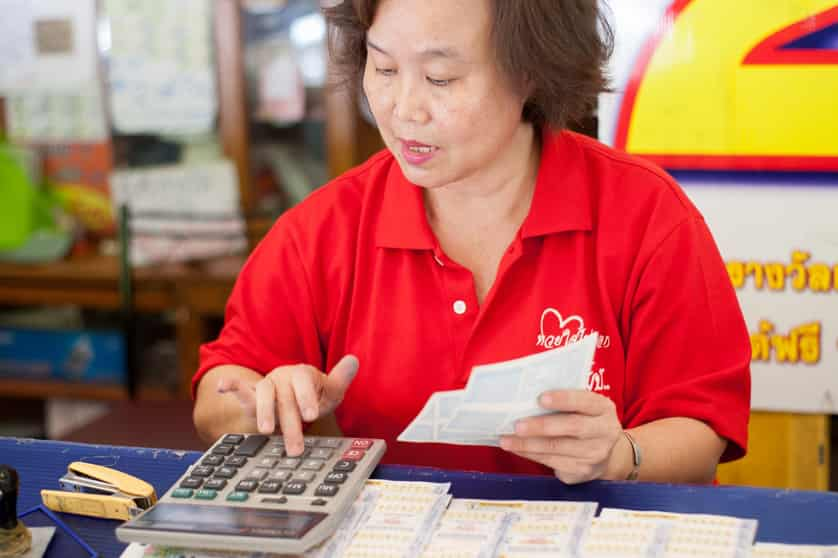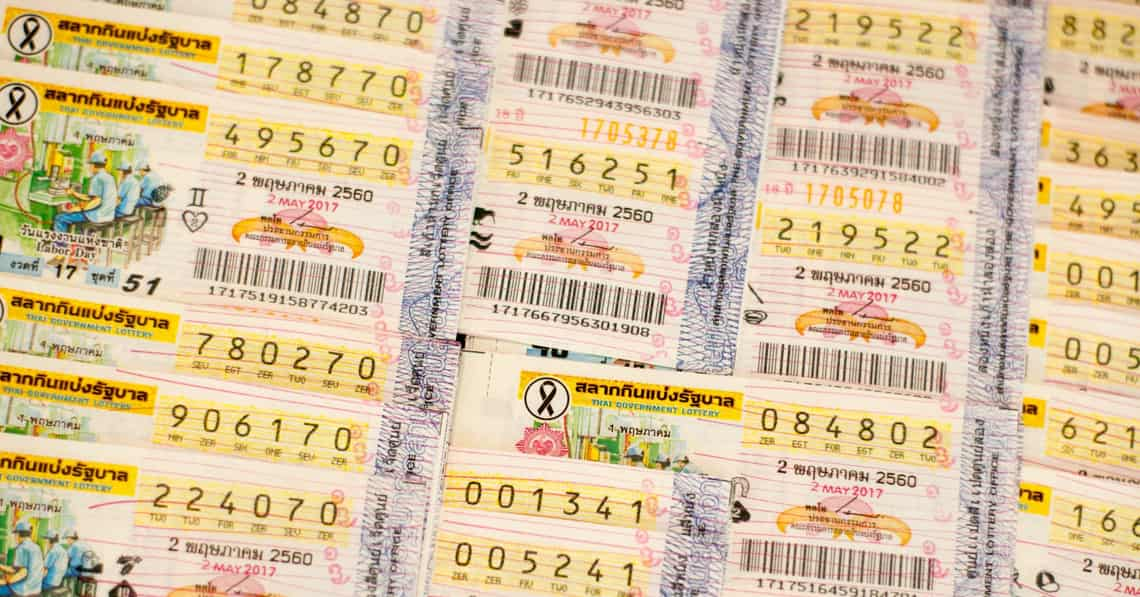“Lotto culture is Thai culture,” Priyawit “Bom” Nikornpant insists. “If you study Thai beliefs and lottery beliefs, you will understand that the thinking systems are analogous.”
The belief systems that cloak lottery-playing methodologies in Thailand are complex, starting with the seemingly simple process of buying a ticket. The first step is to choose which numbers to buy.

Bom’s personal number selection strategy is a first glimpse into some of the mysteries within lotto culture. With a conspiratorial wink, he takes out his phone and displays a photo of a chart with a wheel and a set of digits. His face lights up as he begins scribbling a row of numbers on a sheet of paper while consulting the chart. From that list, he quickly pencils down a second set of integers derived from the first. Then he crosses them out one by one in a specific pattern until he’s left with two digits: 0 and 1. A giddy smile plays at the edges of Bom’s mouth as he presents his results: these are the numbers he would purchase for the next lottery.
Bom’s method is precise, and it evidently follows a well-practiced ritual, but it’s difficult for an outsider to follow. To understand how – and why – over one third of the population of Thailand regularly plays the lottery is to uncover the religious, economic and social connections that comprise some of the roots of Thai culture.
Sweepstake Social Circles
For Bom, his elaborate strategy for choosing lottery numbers is less about having faith in the actual process and more about the enjoyment of choosing numbers with his friends. They have a Line group message together where they share different lottery tactics. “I don’t actually believe in lucky numbers,” he said.
And yet, he buys a lottery ticket about once a month, spending 100 baht or more each time. It’s not the promise of winning that keeps him coming back, because he’s had little success so far: “In the ten years that I’ve played the lottery, I’ve won twice,” he said. “The first time I won 2,500 baht, and the second time I won 600 baht.” Far from having any notions of guaranteed monetary success, Bom appreciates the social aspect of the lottery. When buys a lottery ticket, he’s ensuring that he will have something juicy and potentially scandalous to dissect with friends and colleagues in the weeks after the winning numbers are drawn.
Even with his losing streak, the slim chance that he or his friends might win some money does provide a spark of excitement every lottery drawing. “We do have a small hope that we might win. Hope is 20% of the reason I play the lottery, fun is 50%, and 30% is… sadness,” Bom said. That sadness is the essentially inevitable disappointment that comes from having losing tickets nearly every time.
While Bom knows he won’t be taking home piles of cash from a lottery drawing anytime soon, plenty of others have genuine hope they will win, and it’s their primary motivation for buying tickets. Nidhi Eoseewong, one of Thailand’s most prominent historians, said, “In Thailand, many people are not just playing the lottery for fun. It’s for getting substantial material gain.”
Betting for a Better Life
Nidhi reasons that the volatility of the Thai economy means that business people and entrepreneurs have little faith in their ability to succeed through their work, so the lottery can seem to have only marginally smaller odds of monetary gain than starting a business. “When investing in economics in Thailand, you have to depend on luck much more than in, let’s say, America or Japan,” said Nidhi. “So it’s not so very different from playing lottery.”
Nidhi further explained, “You should be able to make a profit through working and investing smartly. But in Thailand, there is no understandable logic to making money. Even the few billionaires in Thailand make their money not only through investment. They are smart in making investments, but at the same time they made money through connections and other things.”
Dreams of grand prizes can have devastating consequences when they do not pan out. In March of 2015, a resident of Chiang Mai province committed suicide after the lottery tickets he had sold his motorcycle in order to purchase did not win. The note he left for his family explained that the tickets had been his last hope of a better future. Pinning dreams of brighter prospects on such a doomed process isn’t so unreasonable to those who see no other options for making lasting improvements in their lives.
Lotto Logistics
Grand aspirations attached to the lottery are the reasons that on the 1st and 16th of every month — the days when winning lottery numbers are drawn on live television — hordes of hopefuls tune in with tickets clutched in hand.
The incentives and consequences for any person playing the lottery can be convoluted, but the operation of the lottery itself is fairly straightforward. First, tickets must be purchased from vendors registered with the Government Lottery Office (GLO). As of August 2016, there were 35,000 registered lottery vendors in Thailand. Vendors buy the tickets from the GLO, meaning that they are able to claim the winnings themselves from any tickets they do not sell before the drawing.
Every ticket is printed with a six-digit number, and they are sold in pairs for 80 baht per pair so that they can be shared with another person. Each individual ticket allows the holder to potentially claim the grand prize, so if someone keeps both tickets, they could win 6 million baht from the two 3 million baht grand prizes. But the odds of that happening are almost zero.
Going Underground
Where the process gets a bit more involved is in considering that the scope of the lottery reaches beyond the government lottery (which is legal) and into a whole underground system (which is not). This back-alley operation is a microcosmic example of the larger politics and law enforcement rules at play in this country.
The underground lottery uses the same tickets as the government lottery, but has different rules. Dr. Sungsidh Piriyarangsan, Dean of the College of Social Innovation at Rangsit University, estimates that the underground lottery is four to five times larger than the government lottery. Its popularity is due to the fact it is more accessible; anyone who wants to buy individual numbers in the underground lottery can do so for a few baht at a time, whereas playing the government lottery requires having at least 80 baht to spare for a full ticket. The potential pay-outs for the underground lottery are much smaller, but the chances of winning are higher, because it’s possible to buy different combinations of numbers on a single ticket.
Bom was an underground lottery dealer for a time, but he said he was never worried about the fact that he was doing something illegal. As far as he saw it, the practice was so ubiquitous that he almost never heard of people getting into trouble. “Even if you are caught by the police,” he said, “the fine is very small. It’s not expensive to pay it off.”
Politics at Play
The government lottery’s legality has been periodically used as a political tool, another reminder that it is more than a game in Thailand. King Rama VI, who ruled from 1910 to 1925, temporarily banned lottery houses partially due to criticism from the British Empire in an attempt to appeal to Western notions of becoming a ‘civilised’ country.
In more recent decades, the lottery has been protested as a symbol of political corruption. In October 1973, activists burned down the GLO building in protest of military dictators using its profits for personal gain. And in March 2014, Luang Pu Buddha Issara, a politically active monk, led a group of farmers to GLO’s building where they dumped trucks of rice at the entrance in a public demand that the government use revenues from the lottery to pay farmers.
Another point of public criticism against the lottery is that it is a financial drain on the poor. Nidhi said, “I have met quite a few rich people who also play the lottery, but not a large percentage of lottery players are wealthy. The majority of them are the poor or lower middle class.” A report published in the International Gambling Studies Journal in 2006 showed that nearly two-thirds of people who regularly played the lottery were in the low-income bracket, meaning their monthly salary was around a quarter less than the national average.
Despite the ban of all other forms of gambling in Thailand — to the extent that it’s illegal to even sell playing cards — the lottery has been permitted by law for almost a century. The current justifications for its continued existence come from a number of reasons, the first of which is that it is a form of revenue for the government. The GLO reports that 60% of proceeds from lottery ticket sales is allocated for prize money, but no less than 28% is for state revenue.
Employing the Marginalised
Another defence of the government lottery is that, according to reports from the Bangkok Post, it generates four billion baht per year for charities like the Thai Red Cross. Furthermore, it employs people with disabilities as ticket sellers who might not otherwise be able to find work.
Don Willcox, co-founder of the Foundation to Encourage the Potential of Disabled Persons, works extensively with people with disabilities in Chiang Mai. “Many, many disabled persons sell lottery tickets to make a living,” he said. He explained that frequently, employers will not hire people with disabilities because they don’t want to have to make any adjustments to the workplace, such as building ramps or a wider door to the bathroom. Willcox also mentioned a cultural tendency to deliberately relegate people with disabilities to jobs where they are hidden from customers. Lottery ticket selling, therefore, can be a better alternative.
Yet Willcox pointed out that the conditions of working as a ticket seller are still not ideal. “If you go to Kad Suan Kaew, the people who sell lottery tickets sit outside in the area where cars are driving,” he said. “They could go one metre inside the building and be in an air-conditioned situation, but they don’t. They’re working under detrimental conditions with all the exhaust fumes and how hot it is.”
There are plenty of challenges in daily working life for people with disabilities even with a lottery ticket selling job, but this kind of employment does allow them to earn decent pay. This is especially true because, as Willcox said, “Thais often feel it’ll be lucky for them to buy lottery tickets from a disabled person.”

Taking Charge of Luck
Luck can come from many sources for those seeking for any conceivable way to improve their chances at the nearly unwinnable lottery grand prizes. Frequently, lottery players will see lucky numbers in their dreams. Many also consult online gurus like Thai Lottery King or My4Website, whose web pages are devoted to cryptic lottery number formulas and tips that they claim will help people win.
Quite commonly, negative events are thought to be the sources of eventual good fortune in Thai culture, and so lottery participants will try to find numbers relating to car accidents, celebrity deaths or plane crashes.
Bonds with Buddhism
Another common practice is to visit temples to make merit and glean lottery numbers from monks. Buddhism and lottery culture have long had an entwined history, with monks providing lottery consultations as early as 1900.
For the millions of Buddhists regularly purchasing lottery tickets in Thailand, the lottery is the manifestation of good deeds rewarded, which aligns with Buddhist belief systems in which positive actions are met with good fortune. As Dr. Scott explained, rather than overtly contradicting central Buddhist doctrines, lottery practices build upon the religion and create a new network of spirits and patrons.
At a recent Buddhist ceremony at the Citylife office, monks came to give a blessing, and with them they brought an ornate ceramic bowl filled with water and floating jasmine flowers. Bom eagerly gestured to the bowl with a glint in his eye, saying that it was used to divine lucky lottery numbers. He explained that a monk would pray while consulting the bowl, and numbers would come to the monk’s mind. Bom said, “It’s fate. It’s the monk’s imagination, and it’s fate.”
Fate, faith, imagination and superstition all revolve around Thai lottery culture and the country’s religious, political and economic history. Even if it is a doomed investment, purchasing a lottery ticket means buying into a larger culturally unifying phenomenon.
